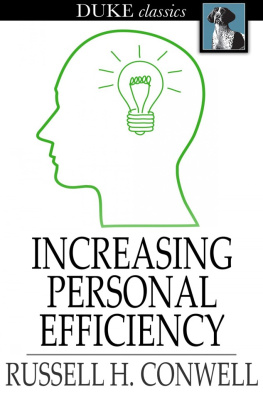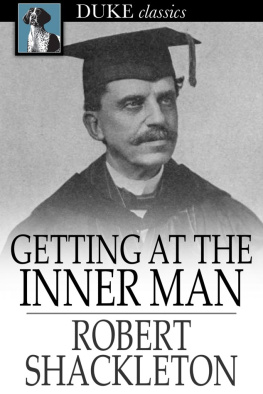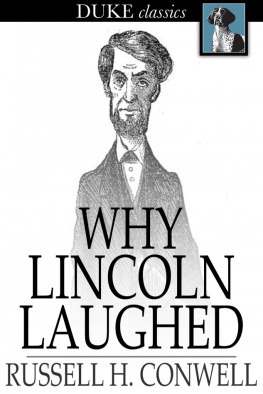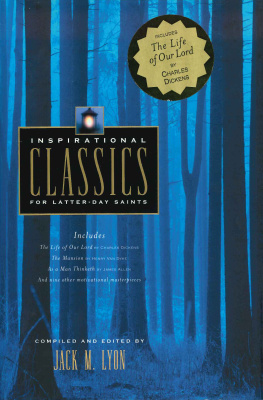INCREASING PERSONAL EFFICIENCY
* * *
RUSSELL H. CONWELL
*
Increasing Personal Efficiency
First published in 1917
ISBN 978-1-62011-762-0
Duke Classics
2012 Duke Classics and its licensors. All rights reserved.
While every effort has been used to ensure the accuracy and reliability of the information contained in this edition, Duke Classics does not assume liability or responsibility for any errors or omissions in this book. Duke Classics does not accept responsibility for loss suffered as a result of reliance upon the accuracy or currency of information contained in this book.
Contents
*
I - Women
*
Some women may be superficial in education and accomplishments,extravagant in tastes, conspicuous in apparel, something more thanself-assured in bearing, devoted to trivialities, inclined to frequentpublic places. It is, nevertheless, not without cause that art hasalways shown the virtues in woman's dress, and that true literatureteems with eloquent tributes and ideal pictures of true womanhoodfromHomer's Andromache to Scott's Ellen Douglas, and farther. WhileShakespeare had no heroes, all his women except Ophelia are heroines,even if Lady Macbeth, Regan, and Goneril are hideously wicked. In themoral world, women are what flowers and fruit are in the physical. "Thesoul's armor is never well set to the heart until woman's hand hasbraced it; and it is only when she braces it loosely that the honor ofmanhood fails."
Men will mainly be what women make them, and there can never beentirely free men until there are entirely free women with nospecial privileges, but with all her rights. The wife makes the home,the mother makes the man, and she is the creator of joyous boyhood andheroic manhood; when women fulfil their divine mission, all reformsocieties will die, brutes will become men, and men shall be divine.There are unkind things said of her in the cheaper writings ofto-dayperhaps because their authors have seen her only inboarding-houses, restaurants, theaters, dance-halls, and atcard-parties; and the poor, degraded stage with its warped mirror showsher up to the ridicule of the cheaper brood. The greatest writings andthe greatest dramas of all time have more than compensated for all thisindignity, and we have only to read deep into the great literature to bedisillusioned of any vulgar estimations of womanhood, and to understandthe beauty and power of soul of every woman who is true to the royaltyof womanhood.
There are few surer tests of a manly character than the estimation hehas of women, and it is noteworthy that the men who stand highest in theesteem of both men and women are always men with worthy ideas ofwomanhood, and with praiseworthy ideals for their mothers, sisters,wives, and daughters. As men sink in self-respect and moral worth, theiresteem of womanhood lowers. The women who become the theme for poets andphilosophers and high-class playwrights are the women who have been bredmainly in the home. They seem without exception to abhor throngs, andonly stern necessity can induce them to appear in them; the motherly,matronly, and filial graces appeal strongly to themsuch as areportrayed in Cornelia, Portia, and Cordelia. They may yearn for society,but it is the best societyfor the "women whose beauty and sweetnessand dignity and high accomplishments and grace make us understand theGreek mythology, and for the men who mold the time, who refresh ourfaith in heroism and virtue, who make Plato and Zeno and Shakespeare andall Shakespeare's gentlemen possible again."
If there is any inferiority in women, it is the result of environmentand of lack of opportunitynever from lack of intelligence and othersoul-powers. There is no sex in spiritual endowments, and woman seemsentitled to all the rights of manplus the right of protection. Ruskinsays, "We are foolish without excuse in talking of the superiority ofone sex over the other; each has attributes the other has not, each iscompleted by the other, and the happiness of both depends upon eachseeking and receiving from the other what the other can alone give."
In speaking of the time when perfect manhood and perfect womanhood hascome, Tennyson says in "The Princess":
Yet in the long years liker must they grow:
The man be more of woman, she of man;
He gain in sweetness and in moral height,
Nor lose the wrestling thews that throw the world;
She mental breadth, nor fail in childward care,
Nor lose the childlike in the larger mind.
Home is the true sphere for woman; her best work for humanity has alwaysbeen done there, or has had its first impulse from within those fourwalls. It was home with all its duties that made the Roman matronCornelia the type of the lofty woman of the world and the worthy mother.While it endowed her with the power to raise two sons as worthy as anyknown to history, who sacrificed their lives in defense of the Romanpoor, it also endowed her with courage to say to the second of her sonswhen he was leaving her for the battle which brought his death, "My son,see that thou returnest with thy shield or on it." Napoleon claimedthat it was the women of France who caused the loss at Waterloo, not itsmen.
"Man's intellect is for speculation and invention, and his energy is forjust war and just conquest; woman's intellect is for sweet ordering,arrangement, and decision; her energy is not for battle, but for rule."Apparently relying upon man's magnanimity not to resent her abdicatingher home, woman's exigenciesand perhaps her ambitionshave forced hermore and more during the past fifty years into man's domains ofspeculation and energyperhaps into some war and some conquest. Theever-increasing demand for her in these man-realms which she has invadedor into which she has intruded herself is abundant evidence that she hascreditably acquitted herself in the betterment of business, education,and literature, as well as in the numberless things which she hasinvented to add beauty and comfort to the home, and to remove much ofthe bitter drudgery from house and office, and to promote the health andhappiness of millions. All these helps she has given, even if she hasundoubtedly lost some of the graces which have always made so lovablethe woman of whom Andromache, Portia, and Cordelia are but types.
Although matrimony and motherhood were the first conditions of women andonly conditions that poets sing about and philosophers write about, andalthough these are still the conditions where she is doing her largestand noblest work in humanizing, yet her proper sphere is as man's,wherever she can live nobly and work nobly. How many myriads in thiscountry alone are drudging or almost drudging in shops and offices torelieve the too stern pressure of pain or poverty from some one who isdear to them, yet are doing it unselfishly and uncomplainingly! A youngwoman lately told me that she had for several years been employed tointerview women applicants for positions; that during these years shehad interviewed scores of women daily, and had learned much of theirprivate lives; that although the majority were working partly orentirely to maintain others, yet had she never heard one complaint ofthe sacrifices this service involved. Hundreds of other women, likeGeorge Eliot, Charlotte Bront and Helen Hunt will long continue tobring pleasure and profit to millions through their writings.
It is women, too, whose inventions have not only lightened domestic workand brightened the home, but also have so far removed the modernschoolroom from the little red schoolhouse of long ago; and it is womenwho have improved the books and the studies for children. They seem tohave entered almost every activity outside of the home, and their finerpowers of observation, aided by their innate love of the beautiful andthe practicality they have learned while in service, seem mainly to havebettered conditions for wage-earners as well as for home and childhood.Think of the thousands upon thousands in this land whose work with thesmaller children of the school could never be so well done by men! Thinkof the service daily rendered by women outside the home, and picture theconfusion that would now arise if all these remained at home, even forone week!














